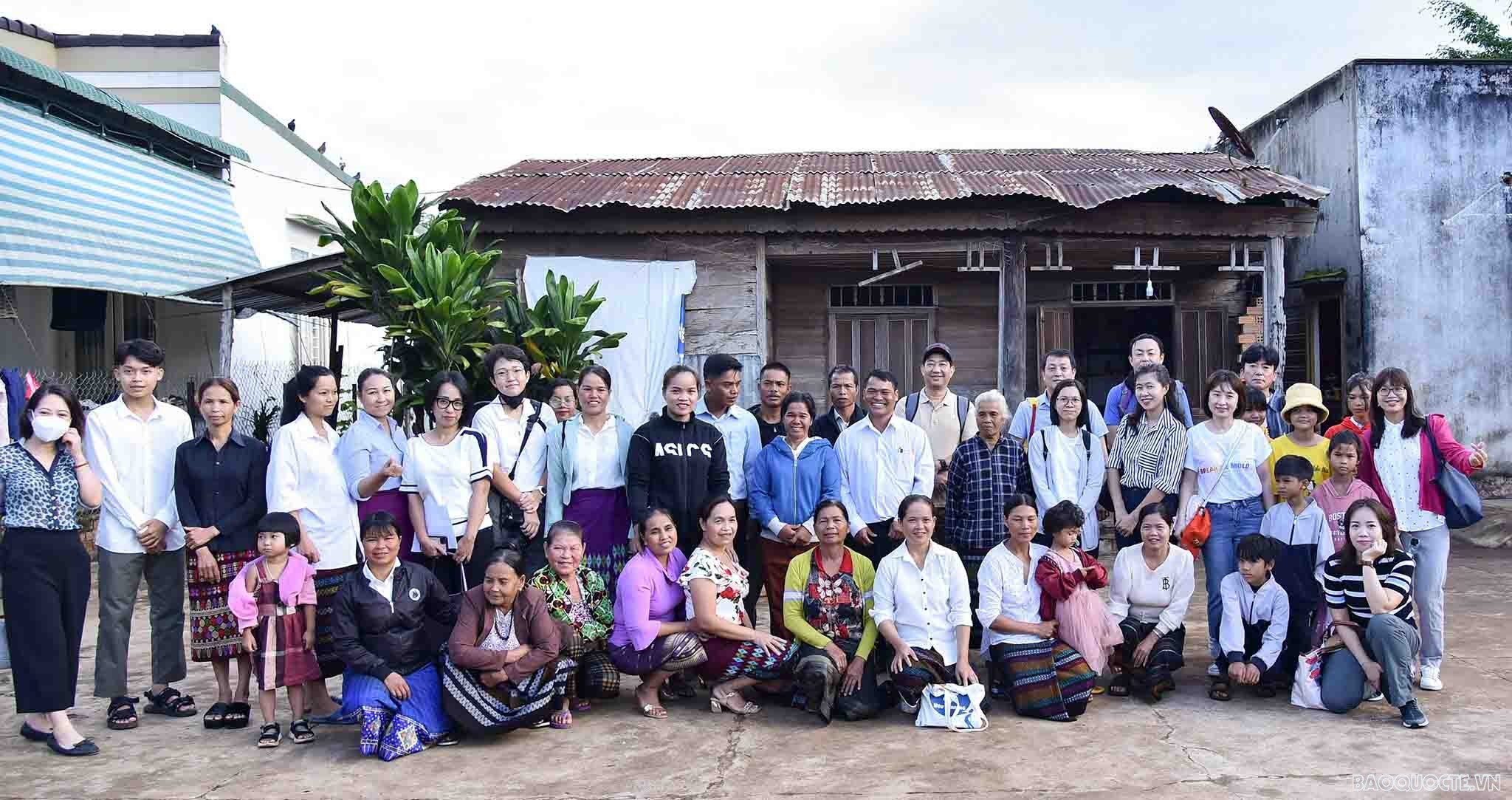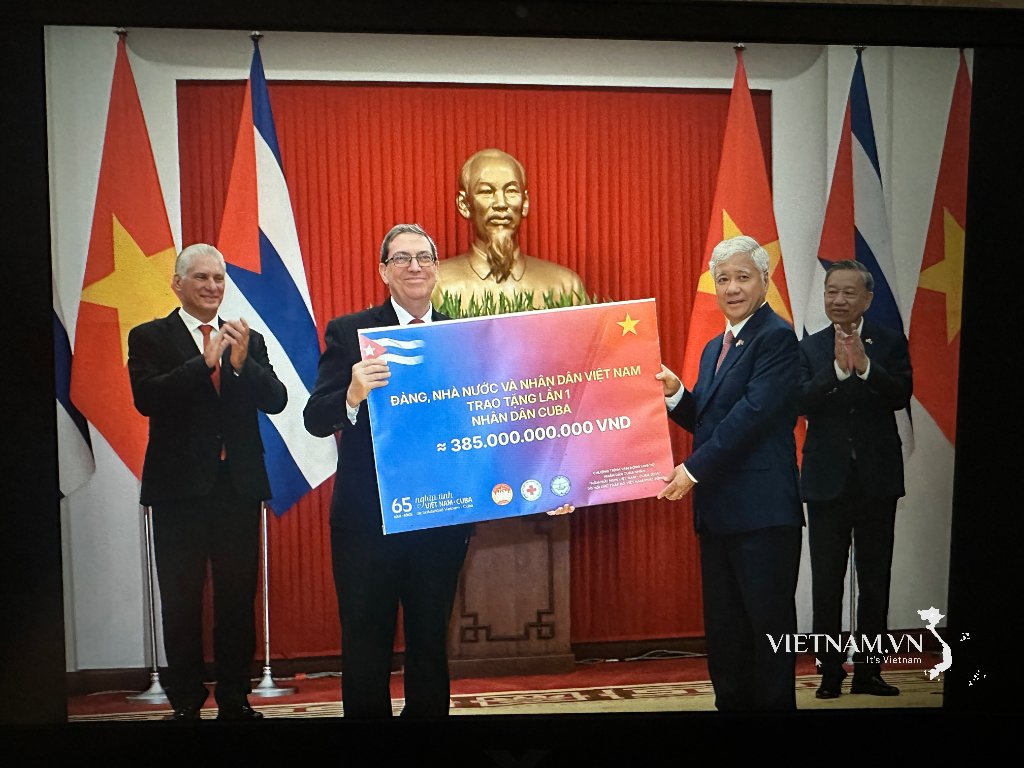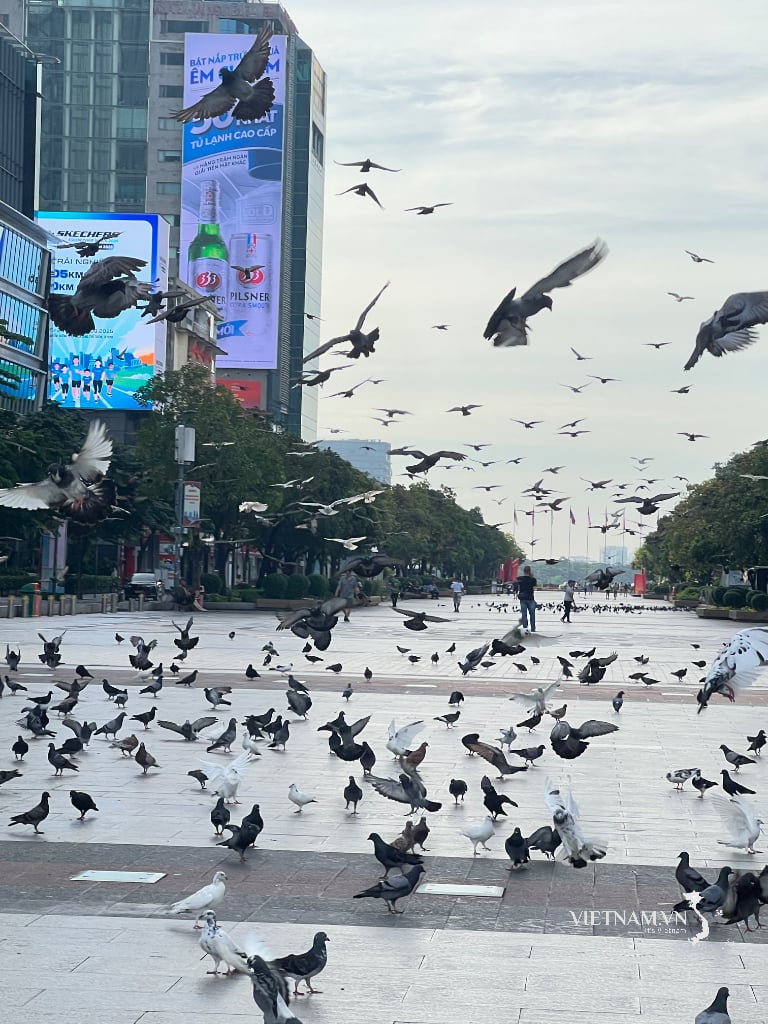In May 2023, the U.S. Commission on International Religious Freedom (USCIRF) and the U.S. Department of State jointly released the 2023 Report on the State of Religious Freedom. While some reports offered positive assessments of Vietnam's efforts to ensure religious freedom, they shared a common tone of criticism regarding the state of religious freedom in Vietnam, clearly demonstrating a stubborn and prejudiced stance that disregarded reality and Vietnam's efforts to guarantee religious freedom.
 |
| A group of foreign journalists visits a place where Catholics in Dak Lak practice their religion. (Photo: Nguyen Hong) |
Interference in Vietnam's internal affairs.
The principle of non-interference in the internal affairs of other states is enshrined in the 1945 United Nations Charter. Subsequently, in 1970 UN General Assembly Resolution 2625, this principle was further clarified and made more specific.
Accordingly, no country or group of countries has the right to interfere, directly or indirectly, for any reason whatsoever, in the internal and external affairs of any other country. According to Article 2, paragraph 7 of the United Nations Charter: “The United Nations shall not interfere in the substantive affairs of the internal affairs of any country.” The obligation not to interfere in the affairs of other countries also applies to all members of the international community.
Therefore, the Vietnamese law's handling of individuals who violate the law, including those who exploit beliefs and religions to engage in subversive activities against the country, is an internal matter, falling under Vietnam's national sovereignty . No other country, organization, or individual has the right to interfere. Furthermore, glorifying, promoting, or supporting such illegal acts is completely unacceptable.
USCIRF is an independent advisory body established by the U.S. Congress to serve the "improvement of human rights" in countries that the U.S. considers to be of "particular concern." USCIRF consistently issues negative assessments of Vietnam, even after being given the opportunity to visit Vietnam and witness the situation firsthand.
Since 2012, USCIRF has consistently recommended that the U.S. State Department include Vietnam on the list of "Countries of Particular Concern - CPC" to provide a basis for imposing sanctions on Vietnam in economic, political, and educational matters. In its annual reports on religious freedom in Vietnam, USCIRF states that Vietnam "represses religion domestically"; criticizes the Vietnamese government and police; and is particularly concerned about the number of individuals who have violated the law and been tried, whom they call "prisoners of conscience".
A biased and unbiased assessment.
The information used by USCIRF in its report mainly comes from unverified sources, collected from Vietnamese organizations and individuals abroad with extremist and hateful ideologies connected to domestic opposition groups. Therefore, it is always lacking in objectivity, accuracy, and even distortions regarding religious freedom in Vietnam.
There are many approaches to religion, and from the perspective of a social organization, in Vietnam it can be divided into two categories: religions and religious organizations that are and are not recognized by the State or granted registration certificates for religious activities; and organizations that falsely claim to be religions or beliefs to profit from or undermine the cause of building and protecting the socialist Vietnamese Fatherland. Based on this, the Party and State of Vietnam have specific viewpoints, policies, and laws.
For recognized religions and religious organizations, registration certificates are issued. The Party and State of Vietnam always pay attention to and create favorable conditions for both religious and secular matters.
According to Article 21, Section 1, Chapter V of the 2016 Law on Beliefs and Religions: “An organization that has been granted a certificate of registration for religious activities is recognized as a religious organization when it meets the following conditions: It has been operating stably and continuously for at least 5 years from the date of issuance of the certificate of registration; it has a charter as prescribed in Article 23 of this Law; its representative and leader are Vietnamese citizens residing in Vietnam, with full civil capacity; they are not currently subject to administrative sanctions in the field of beliefs and religions; they have no criminal record or are not currently accused of crimes under the provisions of the law on criminal procedure; it has an organizational structure in accordance with its charter; it has assets independent from other individuals and organizations and is solely responsible for its liabilities with its own assets; and it participates in legal relations independently in the name of the organization.”
According to data from the Government's Religious Affairs Committee, the State has currently recognized and registered 43 organizations belonging to 16 religions, with over 26.5 million followers, accounting for 27% of the country's population, more than 54,000 religious leaders, over 135,000 religious officials, and nearly 30,000 places of worship. Despite this, extremist and ill-intentioned groups still deliberately distort the truth, calling some religious organizations "state-run religions" or "puppets" of the Party and State.
For religions and religious organizations that have not been recognized by the State or granted registration certificates, authorities at all levels have guided them to operate in accordance with local laws and regulations, providing support in all aspects, especially legal matters, to expedite their consideration, recognition, and issuance of registration certificates.
At the same time, we have regulations to correct and handle violations of the law. This is also what hostile and reactionary forces falsely accuse the Party and the State of "controlling" and "harassing" religions.
With organizations masquerading as religious or faith-based groups to profit and undermine the cause of building and protecting the socialist Vietnamese Fatherland, the Party and State are determined to fight and severely punish them.
These organizations often engage in subversive activities against the Party, the State, and the regime; they closely collude with reactionary forces abroad to disseminate subversive materials; they exploit beliefs and religions to incite and manipulate opposition forces, causing unrest, complicating security and order, affecting social life, and causing many social consequences in recent times.
In Vietnam, as in any country in the world, citizens must abide by the constitution and laws. Religious leaders and followers who are Vietnamese citizens and engage in actions that hinder the reform process or go against the interests of the nation and the country must be severely punished. Religion cannot be used as a justification for violating the law because all individuals are equal before the law, regardless of their religion.
This is the principle of upholding the rule of law in a state governed by the rule of law, and at the same time, it is the basis for affirming our clear and decisive stance in the fight to eliminate evil and wrongdoing in society, creating a normal and healthy religious environment for people of all religions, and also serving as a cautionary lesson for those who want to exploit religion for their own purposes and activities against the country.
| The number of religious organizations granted legal status is increasing and continues to grow. According to data from the Government's Religious Affairs Committee, the State has currently recognized and registered 43 organizations belonging to 16 religions, with over 26.5 million followers, accounting for 27% of the country's population, more than 54,000 religious dignitaries, over 135,000 religious officials, and nearly 30,000 places of worship. |
Practice refutes all distortions.
Freedom of belief and religion in Vietnam is protected by law and is always guaranteed and enforced in practice.
To date, Vietnam has built a relatively complete legal system related to religious freedom, from the 2013 Constitution, the 2004 Ordinance on Beliefs and Religions to the 2016 Law on Beliefs and Religions. Vietnam has essentially completed its legal system on religion, serving as a legal tool to guarantee the right to freedom of belief and religion for all people. It is also one of the few countries in the world (20 countries) to enact separate laws on religious freedom. The organization and implementation of policies and laws on religion are given significant attention.
Freedom of belief and religion in Vietnam is always practiced, protected by law, and facilitated by the government.
The number of religious followers is constantly increasing, and religious and spiritual life is vibrant. According to data from the Government's Religious Affairs Committee, the number of religious followers and dignitaries is continuously rising. In 1997, the whole country had over 15 million followers, accounting for more than 20% of the population; by 2022, there were over 26.5 million religious followers (accounting for approximately 27% of the country's population), more than 54,000 religious dignitaries, 135,000 religious officials, and 29,658 places of worship.
In addition, there are over 200,000 people belonging to 70 private Protestant groups and over 30,000 people belonging to more than 60 new religious phenomena ("unorthodox religions"), who have not registered for centralized religious activities. Furthermore, the vast majority of Vietnamese people have a spiritual life based on traditional polytheistic beliefs.
Besides the 27% of the population who follow a religion, over 75% of Vietnamese people in general, and over 80% of ethnic minorities in particular, adhere to traditional polytheistic beliefs. This is a key difference compared to Western countries or countries with monotheistic religions (Christianity, Islam).
Therefore, although not religiously affiliated, Vietnamese people have a deep spiritual life and actively participate in religious activities. This is quite evident with the 8,000 religious festivals held annually. Religious organizations are given opportunities to participate in social welfare activities and community health care; they have over 500 medical examination and treatment facilities, over 800 social welfare facilities, and 300 kindergens...
The construction of places of worship has been a priority for religious organizations, with many actively promoting it. From 1990 to the present, places of worship have been built and renovated quite extensively throughout the country to meet the religious needs of their followers.
In 2000, the country had 18,474 religious establishments; by 2021, this number had increased to 30,047, a rise of 11,573 establishments in 20 years, averaging 579 new establishments per year. Most of these establishments have been built or renovated to be grand and spacious, with some projects costing tens or even hundreds of billions of dong. Local authorities have shown interest in resolving issues and allocating land to religious organizations for the construction of religious facilities.
International relations of religions are expanding; the religious activities of foreigners in Vietnam are receiving attention, creating conditions for religious organizations to strengthen exchanges, learning, and delegation visits with religious organizations around the world.
From 2011 to the present, approximately 2,000 religious individuals have traveled abroad to participate in training courses, workshops, and international conferences related to religion. Nearly 500 foreign delegations, comprising over 3,000 people, have entered Vietnam to exchange ideas, provide guidance at religious sites in Vietnam, and participate in religious events organized by religious organizations in Vietnam.
The above facts are the clearest evidence refuting all the misinformation in the USCIRF Report. Not only in the religious field, but Vietnam has been striving to ensure human rights for its people in all areas, and is actively and responsibly participating in promoting human rights worldwide, having been elected as a member of the UN Human Rights Council (2023-2025).
REFERENCES
(1) Government Religious Affairs Committee, Law on Beliefs and Religions and Decree detailing some articles and measures for implementing the Law on Beliefs and Religions, Religious Publishing House, Hanoi, 2018.
(2) - Communist Party of Vietnam (2021), Documents of the 13th National Congress, Volume 1, National Political Publishing House, Hanoi, Volume 1.
(3) - Government Religious Affairs Committee (2022), Religion and religious policy in Vietnam, Religious Publishing House, Hanoi
(*) Political Academy, Ministry of National Defence
Source







![[Photo] Soldiers return home to celebrate Tet (Lunar New Year) with the people of Yang Mao remote commune.](https://vphoto.vietnam.vn/thumb/1200x675/vietnam/resource/IMAGE/2026/02/13/1770972833933_img-0360-8494-9922-jpg.webp)










































































































Comment (0)